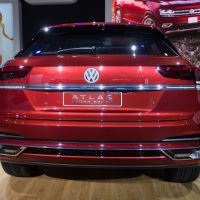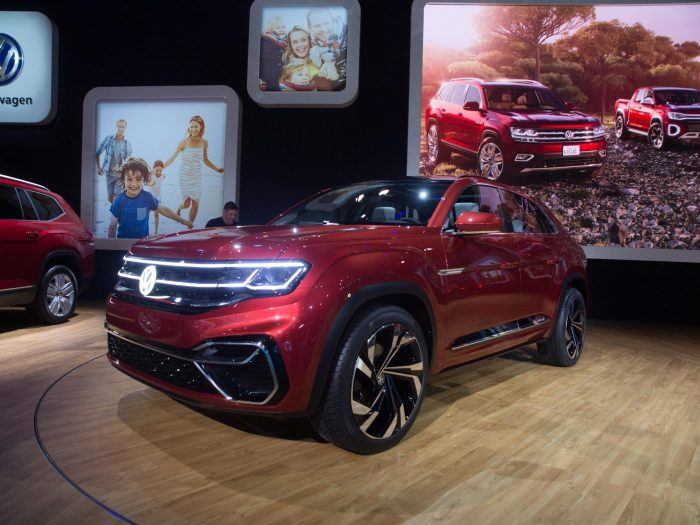In some ways, VW’s Atlas Cross Sport Concept is just that: A concept vehicle at an auto show loaded with gee-wiz features. In a lot of other ways, this is just VW’s latest SUV. But the real key to the Atlas Cross Sport Concept can be found in the press materials when VW says, “Atlas five-seater shows that Volkswagen has a serious SUV strategy.”
In other words, “take our SUVs seriously.” Well, should we take the Atlas Cross Sport Concept seriously?
Up To Speed
For those out of the loop, the quick sketch is that SUVs are a big deal. People want them, for a number of reasons you don’t have to be Sigmund Freud to really figure out. And car makers want to sell them, because the profit margins are higher than traditional cars. So, bottom line: Everybody wants in on the SUV game. And Volkswagen is kind of late to the party. So, their Atlas Cross Sport Concept has to hit all the right notes and make an impression.
The Atlas Cross Sport Concept sits right in the middle of the SUV world. It’s not huge, like an Escalade, and it’s not goofy and tiny, like a Nissan Juke (if the Juke even counts). The Atlas can seat five and carry a lot of their stuff, and it looks like a modern SUV: a big, two-box design resembling a station wagon on steroids.
Just Enough
The Atlas Cross Sport Concept is 7.5 inches shorter than the run-of-the-mill Atlas, yet it keeps the same wheelbase. The most notable loss is that third row, which knocks the seating capacity down to five. So the Atlas Cross Sport Concept is not aimed at big families, but it’s still big enough for most people and most families to use most of the time. VW goes on and on about how it looks, but to my eyes, it’s rather inoffensive and generic and, if anything, there’s not much there to even criticize. What really sets VW’s Atlas Cross Sport Concept apart is the hybrid drivetrain.
Power & Performance
Volkswagen notes the Atlas is based on the company’s modular transverse matrix (MQB) platform, and that it can be “built with all manner of drive systems, including a plug-in hybrid drivetrain.” In other words, look for a bunch of engine choices across the range.
The concept uses the same 3.6-liter V6 FSI engine as the “normal” Atlas, putting out 276 horsepower and 266 lb-ft. of torque. However, that’s just the start, since output is enhanced by two electric motors “fueled” by a compact 18.0 kWh lithium-ion battery housed in the center tunnel. The front motor puts out 54 horsepower and 162 lb-ft. of torque, and the rear motor adds 114 horsepower and 199 lb-ft. of torque to the party. This means a total system power output of 355 horsepower and 1,439,294 lb-ft. of torque.
Wait, I think my figures are a little off for the torque? Let’s just say it puts out a lot of torque, okay? Anyways, you add all that up and this VW concept hits 60 in just 5.4 seconds, topping out at 130 mph.
Drive Modes
And here’s where things get interestingly geeky and gearhead-centric. The software genies that control everything do some very interesting stuff, allowing this concept to operate in any of five modes: E-Mode, Hybrid, GTE, Off-Road or Battery Hold/Battery Charge.
The vehicle always starts out in the all-electric E-Mode if the battery is sufficiently charged. The all-electric driving range is up to 26 miles. Impressive. In E-Mode, drive power is entirely supplied by the 114 horsepower electric motor at the rear axle. Further, the gasoline engine is decoupled from the drivetrain and shut off. As soon as the software decides it needs the V6, it is recoupled to the drivetrain in an almost unnoticeable process.
When working in Hybrid mode, the V6 and/or rear electric motor automatically engage. If the battery is not sufficiently charged at this point, lifting your foot off the accelerator or hitting the brakes will turn the electric motors into generators where the energy recovered from braking is pumped into the lithium-ion battery. In GTE, which is driver-activated via a button, the throttle map, gearshifts, and steering feel sportier, and the V6 and the electric motors work together to access the full system’s power output. Ya-hoo!
If the driver activates the Off-Road mode, the Atlas Cross Sport Concept goes full-on all-wheel drive. The battery’s state of charge is low, and the front electric motor is exclusively used as a generator for the electric motor on the rear axle. This is said to give this show-car Atlas very impressive off-road ability.
Finally, the dual Battery Hold/Battery Charge mode is activated from a menu in the infotainment system. Battery Hold means the energy content of the battery stays constant and Battery Charge means the battery is charged while driving; and all this sounds quite clever. For example, you might use this mode to intentionally prep for driving in the all-electric mode.
In Person
Will this concept be built? Probably, but that’s not the point, I think. The point here is that VW could be sitting on a very flexible drivetrain that can be dropped into a large number of future vehicles. We will have to wait and see. In the meantime, the Atlas Cross Sport Concept is on display the New York International Auto Show, now through April 8th at the Jacob Javits Convention Center.
Tony Borroz has spent his entire life racing antique and sports cars. He is the author of Bricks & Bones: The Endearing Legacy and Nitty-Gritty Phenomenon of The Indy 500, available in paperback or Kindle format. Follow his work on Twitter: @TonyBorroz.
Volkswagen Atlas Cross Sport Concept Gallery









Photos & Source: Volkswagen of America, Inc.
from Automoblog.net https://ift.tt/2GjoEK3



No comments:
Post a Comment